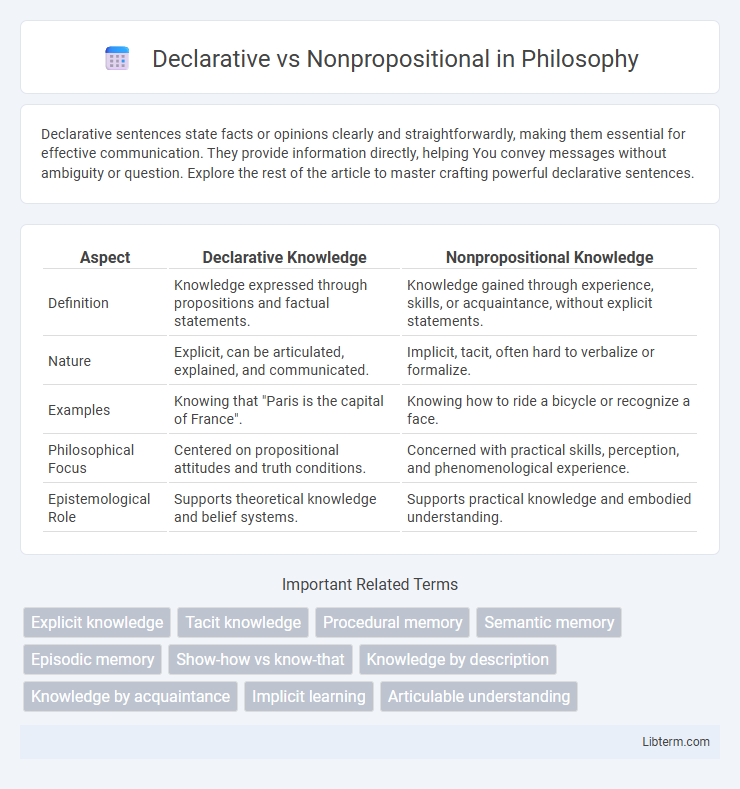Declarative sentences state facts or opinions clearly and straightforwardly, making them essential for effective communication. They provide information directly, helping You convey messages without ambiguity or question. Explore the rest of the article to master crafting powerful declarative sentences.
Table of Comparison
| Aspect | Declarative Knowledge | Nonpropositional Knowledge |
|---|---|---|
| Definition | Knowledge expressed through propositions and factual statements. | Knowledge gained through experience, skills, or acquaintance, without explicit statements. |
| Nature | Explicit, can be articulated, explained, and communicated. | Implicit, tacit, often hard to verbalize or formalize. |
| Examples | Knowing that "Paris is the capital of France". | Knowing how to ride a bicycle or recognize a face. |
| Philosophical Focus | Centered on propositional attitudes and truth conditions. | Concerned with practical skills, perception, and phenomenological experience. |
| Epistemological Role | Supports theoretical knowledge and belief systems. | Supports practical knowledge and embodied understanding. |
Introduction to Declarative and Nonpropositional Knowledge
Declarative knowledge encompasses facts and information explicitly stated, such as dates, events, and definitions, and is easily communicated through language. Nonpropositional knowledge involves experiential, procedural, or tacit understanding that cannot be fully expressed in words, exemplified by skills or know-how. Distinguishing between declarative and nonpropositional knowledge clarifies how humans acquire, represent, and utilize different types of cognitive content.
Defining Declarative Knowledge
Declarative knowledge refers to information that can be explicitly stated and conveyed, such as facts, concepts, and events, making it easily verbalized and stored in memory. It contrasts with nonpropositional knowledge, which involves experiential or procedural understanding not easily articulated in words. Defining declarative knowledge highlights its role in consciously accessible memory, allowing individuals to describe "what" they know and recall detailed information.
Understanding Nonpropositional Knowledge
Nonpropositional knowledge involves skills, experiences, and intuitions that cannot be fully articulated through explicit statements or propositions, distinguishing it from declarative knowledge which is expressible in facts and information. It encompasses tacit understanding, such as riding a bicycle or recognizing faces, relying heavily on procedural memory and embodied cognition. Understanding nonpropositional knowledge requires examining how implicit learning and sensory-motor processes contribute to expertise beyond verbalizable knowledge.
Key Differences Between Declarative and Nonpropositional
Declarative memory involves recalling factual information and explicit knowledge, such as dates, names, and events, whereas nonpropositional memory is related to procedural skills, habits, and conditioned responses that do not require conscious awareness. Declarative memories are consciously accessible and verbally expressible, while nonpropositional memories operate implicitly without the need for conscious recall. The key difference lies in the nature of content: declarative memory stores propositional, semantic, and episodic data, whereas nonpropositional memory encompasses motor skills and conditioned behaviors.
Examples of Declarative Knowledge
Declarative knowledge includes explicit facts and information, such as knowing that "Paris is the capital of France" or "water boils at 100 degrees Celsius." It involves understanding concepts, definitions, and relationships, exemplified by knowledge of historical events or mathematical formulas. This type of knowledge contrasts with nonpropositional knowledge, which is more about skills and experiences, like riding a bike or recognizing a face.
Examples of Nonpropositional Knowledge
Nonpropositional knowledge includes skills and experiences such as riding a bicycle, playing a musical instrument, or recognizing a face, which cannot be easily articulated in declarative sentences. This type of knowledge is embodied in procedural memory and often demonstrated through action rather than verbal explanation. For example, a chef's ability to create a dish or a dancer's mastery of choreography exemplify nonpropositional knowledge.
Importance in Education and Learning
Declarative knowledge, involving explicit facts and information, forms the foundation of educational curricula and assessment methods, enabling students to understand concepts and recall essential data. Nonpropositional knowledge, encompassing skills, tacit understanding, and experiential learning, is crucial for developing critical thinking, creativity, and practical application beyond rote memorization. Emphasizing both types in education ensures a balanced approach, fostering comprehensive cognitive abilities and meaningful learning outcomes.
Role in Cognitive Development
Declarative knowledge, which involves conscious recall of facts and information, plays a crucial role in cognitive development by enabling learners to acquire and organize explicit knowledge about their environment. Nonpropositional knowledge, encompassing skills and procedural memory, supports cognitive growth through experiential learning and implicit understanding without reliance on verbalizable statements. Together, these knowledge types interact to enhance problem-solving abilities and adaptive behaviors essential for intellectual maturation.
Practical Applications in Daily Life
Declarative knowledge involves facts and information that can be explicitly stated, such as knowing a phone number or historical dates, and is crucial for tasks like reading instructions or navigating new environments. Nonpropositional knowledge, often embodied as skills or actions like swimming or riding a bike, enables individuals to perform activities without necessarily verbalizing the steps involved. Practical applications in daily life show that declarative knowledge supports decision-making and problem-solving, while nonpropositional knowledge facilitates efficient execution of routine and complex motor tasks.
Conclusion: Integrating Both Knowledge Types
Integrating declarative and nonpropositional knowledge enhances comprehensive understanding by combining explicit facts with experiential and intuitive insights. Declarative knowledge offers structured, factual information, while nonpropositional knowledge provides context through personal experience and tacit understanding. This synthesis supports more effective decision-making, learning, and application across diverse cognitive tasks.
Declarative Infographic

 libterm.com
libterm.com